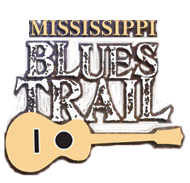Oxford Blues
Oxford Blues - Oxford
This marker is temporarily down for repair.
Lafayette County’s blues history has encompassed a wide range of activity by scholars, promoters, record companies, and musicians. The nightlife of Oxford has welcomed both local performers and national touring acts. The most famous musician born in the county, R. L. Burnside, achieved international acclaim while recording for Oxford-based Fat Possum Records. Some of the earliest documentation of blues was conducted here by Howard Odum in the early 1900s. Lafayette County is best known as the home of Ole Miss and William Faulkner, but it also shares the “hill country” blues traditions found in neighboring counties Marshall, Panola, and Tate.
The region’s distinctive fife and drum picnics often took place in Oxford on the property of African American businesswoman Molly Barr, performed by fife player Tom Lewis, drummers Lacey Redmond and Clint Yarborough, and others. R. L. Burnside (1926-2005), who became the most famous exponent of hill country blues in the 1990s, was born in the College Hill community north of Oxford. He later settled near Holly Springs, but often performed in Oxford, as did his sons Duwayne and Garry and grandsons Cedric and Cody. The Fat Possum label, founded in Oxford in 1991, recorded Burnside and other hill country blues artists including Junior Kimbrough, Robert Belfour, Kenny Brown, and David (Malone) Kimbrough.In the 1960s the leading blues and R&B group in Oxford was the Checkmates, whose initial lead vocalist, Henry Cook, had earlier led Little Henry and the Houserockers. Vocalist-bassist Herbert Wiley, a cousin of Cook’s, later fronted the Checkmates, which also included Melvin Booker, Ivory Redmond, and Samuel Torrance, the band director at Oxford Training School. The Checkmates performed at campus fraternity parties, at clubs as far away as Chicago, and for local African American audiences at clubs on Old Sardis Road including Floyd Holman’s, “Tom Charlie’s,” and the Backwater Inn, run by “Big Boy” and “Little Boy” Pegues, who also ran a juke joint on the east end of Oxford.
Other local blues musicians included guitarist Sam Langhorn, his brother, vocalist Paul Willis Langhorn, bandleader-guitarist Tommy Brooks, and guitarists Jim Boles and Louwell Goodman. According to Herbert Wiley, 1930s recording artist Geeshie Wiley was a distant cousin; it is also likely that Tom Dickson, who recorded for OKeh in1928, was from Oxford. Blues achieved a higher profile in Oxford with the establishment at Ole Miss in 1977 of the Center for the Study of Southern Culture, whose founding director was blues scholar Dr. William Ferris. The many blues aficionados attracted to Oxford included writer Robert Palmer, who taught popular music courses at the university and produced some the first releases on Fat Possum.
Photographer and writer Dick Waterman, who managed many leading blues artists beginning in the 1960s, continued his work after moving to Oxford in the 1980s. Blues musicians have frequently played at downtown venues including the Hoka, the Gin, Syd & Harry’s, Blind Jim’s, Proud Larry’s, Two Stick, and Rooster’s Blues House. Among the many blues artists to record at local studios was Buddy Guy, whose GRAMMY-winning Blues Singer was cut at the Sweet Tea Recording Studio.
content © Mississippi Blues Commission
[ BACK TO TOP ]

